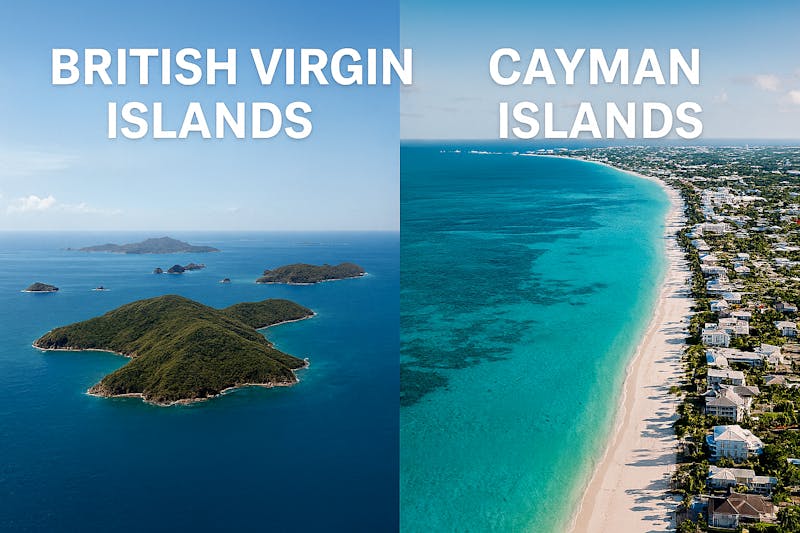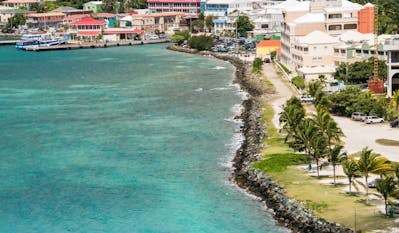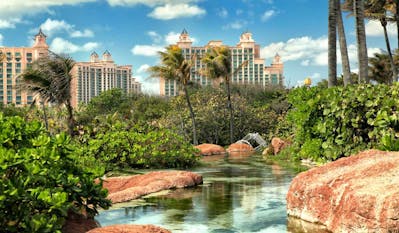BVI Business Company is usually the quickest, lowest-cost offshore vehicle for holding/general business. Cayman Exempted Company/LLC is the default for funds and other high-compliance structures.
Cayman runs the Global Citizen Concierge Program (GCCP) for remote workers; BVI has no digital-nomad visa.
BVI and Cayman are tax-neutral (no corporate income or capital gains tax).
Director names are searchable (for a fee) in both BVI and Cayman; shareholder registers are not public.
Cayman��’s cost of living is among the highest globally; BVI is also expensive but generally lower.
BVI vs Cayman Islands: Comparison
| Category | British Virgin Islands (BVI) | Cayman Islands |
|---|---|---|
| Location | Eastern Caribbean | Western Caribbean |
| Main Islands | 4 major islands, 50+ smaller islets | 3 islands (Grand Cayman, Little Cayman, Cayman Brac) |
| Population (2025) | ~39,000 | ~88,000 |
| Language | English | English |
| Currency | US Dollar (USD) | Cayman Islands Dollar (KYD) (pegged to USD) |
| Time Zone | Atlantic Standard Time (GMT-4) | Eastern Standard Time (GMT-5) |
| Government Type | British Overseas Territory | British Overseas Territory |
| Legal System | English Common Law | English Common Law |
Population figures fluctuate with migration and tourism staffing. Use these as planning baselines, not exact headcounts.
Offshore Company Formation in BVI and Cayman Islands
When comparing BVI vs. Cayman Islands, both remain leading choices for offshore incorporation, but each serves different needs.
BVI Business Company (BVI BC)
- Incorporation usually takes 1–3 business days once KYC (Know Your Customer) is cleared.
- No minimum share capital; flexible share classes are permitted.
- Since 2023, a financial annual return must be filed with the registered agent within 9 months of year-end (not public).
- Director names are searchable at the BVI Registry, but shareholder details remain private.
- Government fees start at US$550 annually for companies with up to 50,000 shares.
For holding companies, trading entities, or entrepreneurs seeking privacy, speed, and low ongoing costs, the BVI Business Company remains the value pick.
Cayman Islands (Exempted Company / Limited Liability Company, LLC)
- Preferred by hedge funds, private equity funds, and joint ventures.
- No minimum capital; no AGM required unless Articles specify otherwise.
- Higher baseline government fees than BVI, plus mandatory economic substance (ES) notifications.
- Stronger institutional reputation and more robust regulatory oversight.
For fund structures and institutional investors, the Cayman Islands typically wins on reputation and regulatory depth.
Economic Substance Rules in BVI and Cayman Islands
British Virgin Islands
- The Economic Substance (Companies and Limited Partnerships) Act has been in force since 2019.
- Relevant activities include finance, intellectual property (IP), shipping, headquarters, and distribution and service centers.
- Investment funds are generally out of scope.
- Fund managers and administrators fall in scope when conducting relevant activities.
- Annual Economic Substance notification is filed through the BOSS(ES) portal.
- Enforcement involves monetary penalties that increase for repeat offences.
Cayman Islands
- The International Tax Co-operation (Economic Substance) Act has been applied since 2019.
- Relevant activities include finance, intellectual property (IP), shipping, holding companies, fund management, and headquarters business.
- Investment funds are usually out of scope.
- Fund managers and administrators are firmly in scope.
- Annual Economic Substance notification and supporting documentation must be submitted to the Tax Information Authority (TIA).
- Enforcement is generally considered tighter than in the BVI, with stricter documentation requirements and closer scrutiny.
Taxes and Fees in BVI Compared to Cayman Islands
Taxes
- BVI: No corporate income tax, capital gains tax, or withholding tax. Payroll tax and stamp duty apply in limited cases.
- Cayman: No corporate income tax, capital gains tax, or withholding tax.
Annual Government Fees
- BVI: The lowest fee band for a standard company authorized up to 50,000 shares is about US$450. Higher bands increase based on authorized share capital.
- Cayman: Exempted Company annual fees start around US$854 and scale with authorized share capital, with additional fixed filing fees.
Stamp Duty Rules
- BVI: No stamp duty on most share transfers, unless the company owns BVI land or the instrument is executed in or relates to the BVI. Land transactions attract duty.
- Cayman: Stamp duty applies to real estate and to certain instruments listed in the relevant schedules.
Cost of Living and Infrastructure in BVI and Cayman Islands
Cayman Islands
- Cayman consistently ranks among the most expensive places to live worldwide, topping the Numbeo mid-year cost-of-living index.
- The jurisdiction offers strong road networks, reliable utilities, and extensive flight connections.
- Owen Roberts International Airport and Cayman Airways provide regular direct flights to hubs such as Miami and New York.
British Virgin Islands (BVI)
- The cost of living in the BVI is high but usually lower than Cayman.
- Residents and visitors rely on frequent inter-island ferries for transport.
- American Airlines operates a nonstop Miami–Tortola (EIS) route, though service is often seasonal.
Visas and Residency in BVI and Cayman
Cayman Islands
- The Global Citizen Concierge Program (GCCP) allows remote workers to stay for up to two years, subject to meeting income thresholds.
- Several residency options exist, including investment-linked certificates and pathways to permanent residence, each with distinct eligibility criteria.
British Virgin Islands (BVI)
- The BVI currently has no digital nomad visa program.
- Long-term presence usually requires employment or operating a locally incorporated company, both of which involve obtaining the necessary permits.
BVI vs Cayman: Which Jurisdiction Fits Your Needs?
| Category | British Virgin Islands (BVI) | Cayman Islands |
|---|---|---|
| Best For | Lower fees, simple maintenance, strong for holding companies and general business. | Funds, private equity, and institutional structures, plus broader residency pathways. |
| Offshore Company Setup | Fast turnaround (1–3 days once due diligence clears), low government fees, minimal share capital requirements. | Efficient incorporation, but higher fees; preferred for fund-related entities and complex ventures. |
| Economic Substance | Moderate rules, with exemptions for most investment funds; simpler filings through agents. | Stricter requirements with more robust enforcement and documentation expectations. |
| Beneficial Ownership | 10% threshold, filings required via VIRRGIN from 2025; lower compliance burden. | Similar disclosure rules but often seen as tighter in practice for due diligence and banking. |
| Cost of Living | High but generally lower than Cayman; inter-island ferries common; seasonal direct flights (e.g., Miami–Tortola). | Among the world’s costliest, especially Grand Cayman; excellent roads, utilities, and frequent direct flights (Miami, New York, London). |
| Tourism Appeal | Adventure and sailing focus: The Baths, boutique villas, quieter and nature-driven. | Luxury lifestyle: Seven Mile Beach, Stingray City, family-friendly resorts, polished infrastructure. |
| Cultural Style | Afro-Caribbean heritage, local and traditional feel. | Cosmopolitan and international, strong expat presence. |
| Visa & Residency | No digital nomad visa; long-term presence requires employment or setting up a local company. | Global Citizen Concierge Program (GCCP) offers remote work stay up to 2 years; additional residency options tied to investment or permanent residence. |
| Day-to-Day Lifestyle | Quieter, nautical vibe, more low-key living. | Polished infrastructure, frequent flights, and stronger connectivity. |
Conclusion
Both the British Virgin Islands and the Cayman Islands remain top offshore destinations, but they serve different needs. If the priority is fast, cost-effective incorporation, BVI is the stronger pick. For fund structures, regulatory recognition, and expat lifestyle, Cayman usually wins.
Still weighing BVI vs Cayman Islands? Air Corporate simplifies offshore company formation across both jurisdictions.
FAQs
It depends on your priorities. The BVI is better for cost-effective company setup and sailing-focused tourism. The Cayman Islands is better for high-end finance, expat infrastructure, and remote work options.
The BVI generally has a lower cost of living, especially outside of Tortola. Cayman is more expensive, particularly for housing, utilities, and dining.
For general-purpose holding companies and startups, BVI offers simplicity and lower fees. For fund management and financial services, Cayman has more regulatory strength and international recognition.
Yes, but the Cayman Islands offers more accessible long-term options, including a remote work visa and investment-based residency. The BVI requires employment or business registration for long-term stays.
Consider the nature of your business, compliance requirements, and budget. If you're unsure, Air Corporate can help assess your needs and recommend the best jurisdiction for you.






